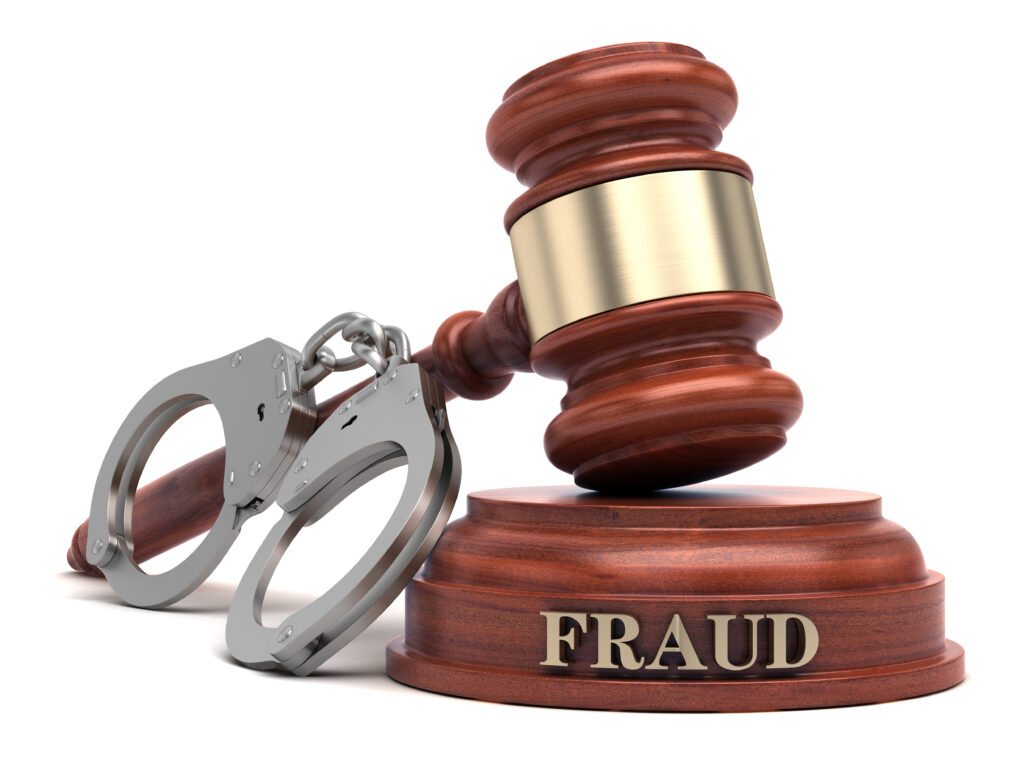Mail and wire fraud are offenses typically prosecuted at the federal level. Upon conviction, individuals may face jail time, hefty monetary fines, and other serious penalties and collateral consequences. If you are currently facing one of these charges, you need to consult with a knowledgeable federal criminal defense attorney right away. Your lawyer can plan an aggressive defense strategy for you and pursue the best possible result in your case.
What are the Legal Elements of Federal Mail and Wire Fraud?
Federal mail and wire fraud are serious crimes in the United States. Both involve schemes to deceive or trick someone out of money, property, or something valuable. Here’s a look at the key legal elements that define these crimes.
Mail Fraud
Mail fraud involves using the postal service or any mail carrier to commit fraud. The legal elements of mail fraud are:

- Scheme to Defraud – There must be a deliberate plan or trick intended to deceive someone. This plan aims to get money or property by lying or making false promises.
- Material Misrepresentation – The lies or false promises must be significant enough to influence the victim’s decision. It’s not enough to lie about something trivial.
- Intent to Defraud – The person committing the fraud must have a clear intent to deceive. They must knowingly and purposely try to trick someone to get something valuable.
- Use of Mail – The scheme must involve using the postal service or a private mail carrier at some point. Even if the mail is just a small part of the plan, it still counts.
Wire Fraud
Wire fraud is similar to mail fraud but involves electronic communications. The legal elements of wire fraud are:
- Scheme to Defraud – Just like mail fraud, there must be a deliberate plan to deceive someone to get money or property.
- Material Misrepresentation – The false statements or promises must be significant enough to affect the victim’s decisions.
- Intent to Defraud – The person must have a clear intent to deceive, knowing their actions are dishonest.
- Use of Interstate Wires – This involves using electronic communications like phone calls, emails, or the internet. The communication must cross state lines, even if it’s just a small part of the scheme.
Potential Penalties upon Conviction for Federal Mail Fraud or Wire Fraud
Federal mail and wire fraud are serious offenses that involve using the postal system or electronic communications to commit fraud. If someone is convicted of these crimes, they can face significant penalties. These penalties are intended to punish the alleged wrongdoer and deter others from committing similar crimes.
- One of the primary penalties for federal mail and wire fraud is imprisonment. A person convicted of either mail or wire fraud can face up to 20 years in federal prison. However, if the fraud involves a financial institution or a presidentially declared major disaster or emergency, the maximum sentence increases to 30 years.
- Fines are another major penalty for mail and wire fraud. The court can impose hefty fines on convicted individuals. For each count of mail or wire fraud, a person can be fined up to $250,000. If a corporation is found guilty, the fine can go up to $500,000 per count. These fines are designed to serve as a financial deterrent against committing fraud.
- In addition to imprisonment and fines, those convicted of mail or wire fraud may be required to pay restitution. Restitution involves compensating alleged victims for their losses. This means that the convicted person must return any money or property they allegedly obtained through fraudulent means. The amount of restitution can be significant, often amounting to millions of dollars, depending upon the scale of the fraud.
- Another potential penalty is supervised release. After serving their prison sentence, individuals may be placed under supervised release for a certain period. During this time, they must comply with various conditions that the court establishes, such as regular reporting to a probation officer, finding employment, and avoiding further criminal activity. Violation of these conditions can result in being sent back to prison.
- A conviction for mail or wire fraud also has long-term consequences beyond the potential legal penalties. A criminal record can make it difficult to find employment, obtain professional licenses, or even secure housing. The stigma of a fraud conviction can severely affect a person’s reputation and future opportunities.
Defending against a Charge for Federal Mail or Wire Fraud
Defending against a charge for federal mail or wire fraud is complicated, but there are several strategies that can be successful. These defenses may include proving lack of intent, demonstrating that no fraud occurred, or showing that the defendant did not use the mail or wire communications to commit fraud.
- One key defense is proving a lack of intent. For a conviction, the prosecution must show that the defendant intended to commit fraud. This means that the person accused must have knowingly and willfully engaged in deceitful practices to defraud someone. If the defense can show that the defendant did not intend to defraud anyone, then the charges may be dismissed. For example, if the accused made an honest mistake or had a misunderstanding, it can be argued that there was no intent to commit fraud.
- Another defense is demonstrating that no fraud occurred. This strategy involves showing that the defendant’s actions did not meet the legal definition of fraud. Fraud typically requires a scheme to obtain money or property through false pretenses. If the defense can prove that the statements or actions in question were not false or misleading, then the fraud charges may not stand. For instance, if the alleged misrepresentations were actually true or if there was no significant effect on the victims, this defense can be effective.
- Additionally, the defense might argue that the use of mail or wire communications was not connected to the alleged fraudulent scheme. To secure a conviction for mail or wire fraud, the prosecution must prove that the defendant used mail or electronic communications as part of the fraudulent activity. If the defense can show that the use of mail or wire communications was incidental or unrelated to the fraud, this can lead to a dismissal of the charges. For example, if the alleged fraud was carried out entirely in person without relying on mail or electronic communications, then the mail or wire fraud charges may be dropped.
- Another possible defense is entrapment. If law enforcement officials induced the defendant to commit a crime that they otherwise would not have committed, the defense can argue entrapment. This requires showing that the defendant was not predisposed to commit the crime and that they were persuaded or coerced by government agents.
Successfully defending against federal mail or wire fraud charges involves a detailed analysis of the facts and circumstances surrounding the case. By proving a lack of intent, demonstrating no fraud occurred, questioning the use of communications, or arguing entrapment, a skilled defense attorney can effectively challenge the charges and seek a favorable outcome for the accused.
Accepting a Plea Deal in a Federal Mail or Wire Fraud Case
Accepting a plea deal in a federal mail or wire fraud case can have both advantages and disadvantages. Understanding these pros and cons is crucial for making an informed decision.

Pros:
- Reduced Sentencing – One of the main benefits of accepting a plea deal is the potential for a reduced sentence. In exchange for pleading guilty to a lesser charge or fewer counts, the defendant may receive a lighter punishment than if found guilty at trial. This can mean less time in prison and lower fines.
- Certainty and Predictability – Plea deals provide some level of certainty and predictability. Trials are unpredictable, and even if the defense seems strong, there is always a risk of conviction and a harsher sentence. Accepting a plea deal can eliminate this uncertainty and provide a clear understanding of the consequences.
- Quicker Resolution – Plea deals can lead to a quicker resolution of the case. Trials can be lengthy and stressful, involving extensive preparation and time in court. By accepting a plea deal, the defendant can avoid the prolonged process and move on with their life sooner.
- Lower Legal Costs – Going to trial can be expensive, with high legal fees for defense attorneys and other related costs. Accepting a plea deal can reduce these expenses significantly.
Cons:
- Admitting Guilt – Accepting a plea deal usually involves admitting guilt to the charges. This admission becomes part of the public record and can have long-term consequences, such as a criminal record that affects future employment and personal reputation.
- Waiving Rights – By accepting a plea deal, the defendant waives certain rights, including the right to a trial by jury, the right to confront witnesses, and the right to appeal. This means giving up the opportunity to potentially be acquitted or have the charges dismissed at trial.
- Potential for a Better Outcome at Trial – If the defense is strong and there are valid arguments for innocence or procedural errors, going to trial may result in a better outcome, such as acquittal or dismissal of charges. Accepting a plea deal forfeits this possibility.
- Effect on Future Legal Issues – A plea deal in a fraud case can have significant implications for future legal issues, including sentencing in any subsequent cases. A prior guilty plea can also lead to harsher penalties for future offenses.
While accepting a plea deal can offer reduced sentencing, certainty, quicker resolution, and lower legal costs, it also involves admitting guilt, waiving rights, potentially missing a better trial outcome, and affecting future legal issues. It’s important to weigh these pros and cons carefully with the guidance of an experienced criminal defense attorney. Your lawyer can then help you make the best decision for your case.
Taking a Federal Mail or Wire Fraud Case to Trial
Taking a federal mail and wire fraud case to trial involves a detailed and often complex process that unfolds in court. Here’s what typically happens:

- Pre-Trial Preparation – Before the trial begins, both the defense and the prosecution spend a significant amount of time preparing their cases. This includes gathering evidence, interviewing witnesses, and filing motions. The defense may file motions to dismiss the case or suppress certain evidence, arguing that it was improperly obtained.
- Jury Selection – The trial process starts with jury selection, known as voir dire. During this process, both sides question potential jurors to determine if they can be fair and impartial. The goal is to select a jury that will objectively evaluate the evidence presented during the trial.
- Opening Statements – Once the jury is selected, the trial begins with opening statements from both the prosecution and the defense. During these statements, each side outlines their case and what they intend to prove. The prosecution goes first, followed by the defense.
- Presentation of Evidence – The prosecution presents its case first, calling witnesses and introducing evidence to prove that the defendant committed mail or wire fraud. This can include documents, emails, phone records, and testimony from witnesses. The defense has the opportunity to cross-examine each witness, challenging their credibility and the evidence presented.
- Defense’s Case – After the prosecution rests, the defense presents its case. The defense may call its own witnesses, including the defendant, to refute the prosecution’s claims. They may present evidence showing that the defendant did not intend to commit fraud or that no fraud occurred.
- Closing Arguments – Once both sides have presented their cases, they make closing arguments. This is their final chance to address the jury and summarize their key points. The prosecution will argue why the evidence proves the defendant’s guilt, while the defense will highlight doubts and inconsistencies to argue for acquittal.
- Jury Deliberation – After closing arguments, the judge gives the jury instructions on the law and the standards they must use to decide the case. The jury then deliberates in private, discussing the evidence and reaching a verdict. This can take a few hours to several days.
- Verdict and Sentencing – If the jury finds the defendant not guilty, they are acquitted and released. If found guilty, the case moves to the sentencing phase, where the judge determines the appropriate punishment based on federal sentencing guidelines.
Taking a federal mail and wire fraud case to trial is a serious and involved process, requiring careful preparation and a strong legal defense to challenge the prosecution’s evidence and arguments. An experienced criminal defense lawyer can help you decide whether to take your case to trial and aggressively advocate for you during all legal proceedings.
Speak with an Experienced Criminal Defense Lawyer Right Away about Your Options
If you are currently facing a criminal charge for federal mail or wire fraud, you need to seek out experienced legal counsel as soon as possible. Your criminal defense attorney can promptly identify your legal options, determine potential defenses, and help you make informed decisions throughout the process.

